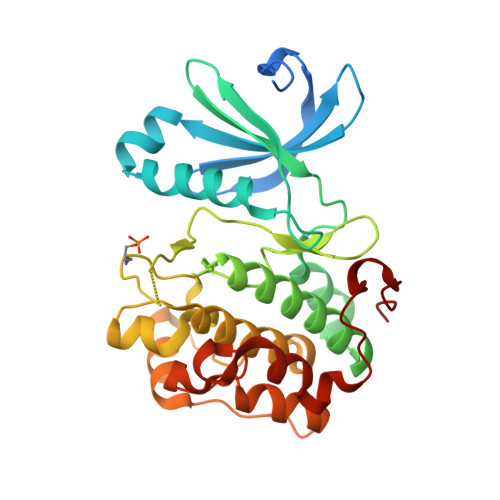Discovery of Novel, Potent, and Selective Inhibitors of 3-Phosphoinositide-Dependent Kinase (PDK1).
Murphy, S.T., Alton, G., Bailey, S., Baxi, S.M., Burke, B.J., Chappie, T.A., Ermolieff, J., Ferre, R., Greasley, S., Hickey, M., Humphrey, J., Kablaoui, N., Kath, J., Kazmirski, S., Kraus, M., Kupchinsky, S., Li, J., Lingardo, L., Marx, M.A., Richter, D., Tanis, S.P., Tran, K., Vernier, W., Xie, Z., Yin, M.J., Yu, X.H.(2011) J Med Chem 54: 8490-8500
- PubMed: 22040023
- DOI: https://doi.org/10.1021/jm201019k
- Primary Citation of Related Structures:
3RWP, 3RWQ - PubMed Abstract:
Analogues substituted with various amines at the 6-position of the pyrazine ring on (4-amino-7-isopropyl-7H-pyrrolo[2,3-d]pyrimidin-5-yl)pyrazin-2-ylmethanone were discovered as potent and selective inhibitors of PDK1 with potential as anticancer agents. An early lead with 2-pyridine-3-ylethylamine as the pyrazine substituent showed moderate potency and selectivity. Structure-based drug design led to improved potency and selectivity against PI3Kα through a combination of cyclizing the ethylene spacer into a saturated, five-membered ring and substituting on the 4-position of the aryl ring with a fluorine. ADME properties were improved by lowering the lipophilicity with heteroatom replacements in the saturated, five-membered ring. The optimized analogues have a PDK1 Ki of 1 nM and >100-fold selectivity against PI3K/AKT-pathway kinases. The cellular potency of these analogues was assessed by the inhibition of AKT phosphorylation (T308) and by their antiproliferation activity against a number of tumor cell lines.
Organizational Affiliation:
Pfizer Global Research and Development, 10770 Science Center Drive, San Diego, California 92121, United States. [email protected]


















